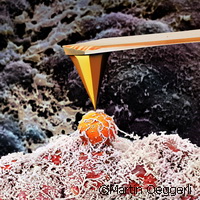Sophisticated diagnostics tackle breast cancer
Despite the intense efforts of researchers to improve our understanding about breast cancer, women continue to be diagnosed with this disease. In the European Union, a woman is diagnosed with breast cancer every 2.5 minutes while every 7.5 minutes a woman dies from the disease. Experts believe the diagnostics of breast cancer are both slow and subjective. The main problem, they say, is that there is not enough information to determine whether the spread of cancer, known as metastasis, has already occurred. However, researchers from Biozentrum and the Swiss Nanoscience Institute, University of Basel believe it is possible to find key information regarding a connection between metastasis and specific structural alterations in cancer cells and the surrounding extracellular matrix. With this in mind, they launched ARTIDIS ('Automated and reliable tissue diagnostics') to measure the local nanomechanical properties of tissue biopsies. The researchers used an ultra-sharp atomic force microscope tip of several nanometres in size to 'feel' the cells and extracellular structures within a tumour biopsy. They obtained a nanomechanical 'fingerprint' of the tissue by gathering tens of thousands of force measurements over a full biopsy. Their data, obtained by evaluating more than 100 patient biopsies, show the fingerprint of malignant breast tumours is significantly different compared to healthy tissue and benign tumours. A group from the University Hospital Basel validated the data by performing histological analyses. 'This unique fingerprint reflects the heterogeneous make-up of malignant tissue whereas healthy tissue and benign tumours are more homogenous,' said Biozentrum member Dr Marija Plodinec. According to the researchers, they found a marked predominance of 'soft' regions in malignant tissue, which was characteristic of cancer cells and the altered microenvironment at the tumour core. What is especially important about the results is the idea that soft cancer cells have the capacity to easily deform and 'squeeze' through their surroundings. They said the presence of the same type of 'soft' phenotype in secondary lung tumours of mice supports the link between the physical properties of cancer cells and their ability to metastasise. 'Resolving such basic scientific aspects of cancer further underscores the use of nanomechanical fingerprints as quantitative markers for cancer diagnostics with the potential to prognose metastasis,' explained Dr Marko Loparic, ARTIDIS Project Manager. At present, the Biozentrum team needs four hours to complete a biopsy analysis versus the traditional diagnostics method that can take up to a full week. Thanks to the results, the Commission for Technology and Innovation (CTI) in Switzerland has granted CHF 1.2 million to the Biozentrum team and the Swiss company Nanosurf AG to further develop ARTIDIS into a sophisticated device for disease diagnostics that can be used in nanomedicine.For more information, please visit:Biozentrum:http://www.biozentrum.unibas.ch/
Countries
Switzerland



